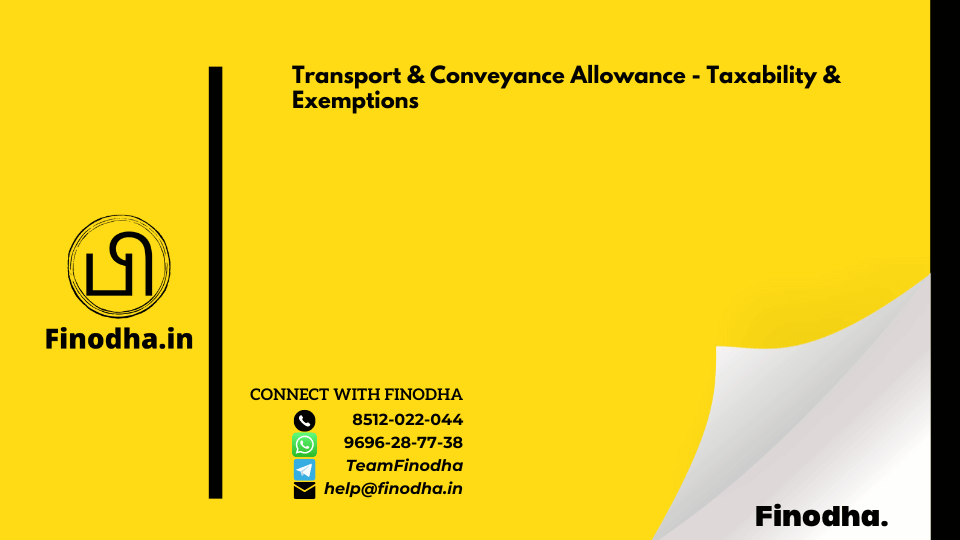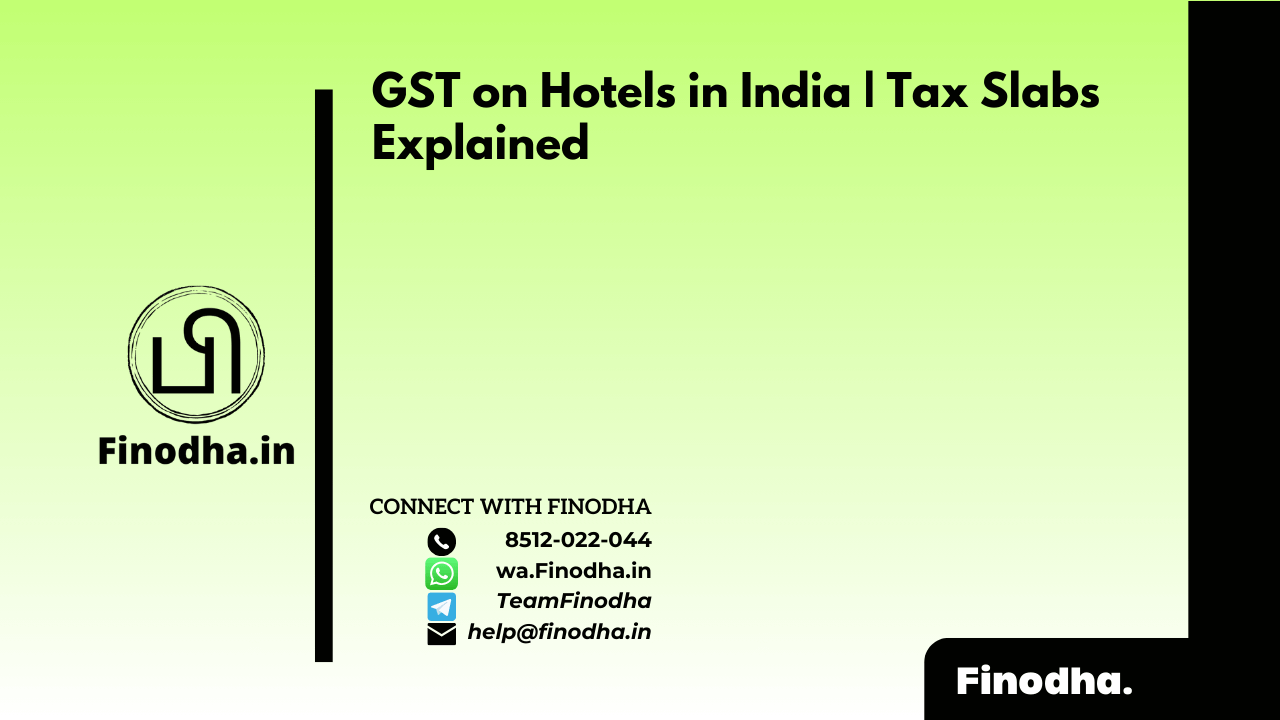Important Keyword: Conveyance Allowance, Salary Components, Salary Income, Transport Allowance.
Table of Contents
Transport & Conveyance Allowance – Taxability & Exemptions
In an employee’s compensation package, the basic salary holds significant importance, serving as the foundation of their earnings. Alongside this fundamental component, employers often include various allowances like House Rent Allowance (HRA), Leave Travel Allowance (LTA), transport allowance, and conveyance allowance. It’s essential to understand the distinction between conveyance allowance and transport allowance, as well as the rules governing exemptions.
Conveyance allowance is typically granted to cover the costs associated with an employee’s daily commute to and from work. This allowance is usually a fixed amount provided by the employer on a regular basis, such as monthly, to help alleviate the financial burden of transportation.
On the other hand, transport allowance is designed to offset expenses related to commuting between an employee’s residence and their workplace. Unlike conveyance allowance, which focuses on daily commuting, transport allowance encompasses broader transportation expenses, including regular travel between home and office.
When it comes to claiming exemptions for conveyance allowance, certain rules must be followed. The exemption is available if the conveyance allowance is provided specifically to cover expenses incurred during the course of employment-related duties. However, it’s important to note that conveyance allowance becomes fully taxable if it is not utilized for business-related travel purposes.
For transport allowance, the exemption rules differ. As per the provisions of the Income Tax Act, transport allowance of up to INR 1,600 per month is eligible for exemption from taxation. It’s worth noting that this exemption applies exclusively to salaried employees and does not extend to individuals receiving travel benefits as part of their overall compensation package.
What is the meaning of Conveyance Allowance and Transport Allowance?
Transport allowance, as per section 10(14) of the Income Tax Act, is allocated to employees to offset the expenses incurred during their daily commute between their residence and workplace, and vice versa. Alternatively, it may be utilized for personal expenditure for individuals in the transport business who do not receive a daily allowance.
Conversely, conveyance allowance, governed by section 10(45) of the Income Tax Act, is an allowance extended to taxpayers earning a salary to cover transportation expenses incurred during official duties. Typically, this allowance is granted when the employer does not offer transportation services to the employees.
Limit for Transport Allowance Exemption
Section 10(14) with Rule 2BB provides conditions for transport allowance exemption. The following table explains the amount of exemption:
| Particulars | Exemption limit |
| Transport allowance for commuting from place of residence to place of duty (with effect from FY 2018-19 no such separate transport allowance is allowed) | INR 1,600 per month or INR 19,200 per annum |
| Transport allowance for commuting from place of residence to place of duty for an employee who is physically challenged such as blind/deaf/dumb or orthopedically handicapped with disability of lower extremities | INR 3,200 per month or INR 38,400 per annum |
| Transport allowance for employees of transport business for meeting personal expenditure during the running of such transport | The exemption amount shall be lower of following: a) 70% of such allowance; or b) INR 10,000 per month |
Until the financial year 2014-15, the exemption limit for transport allowance stood at Rs. 800 per month (INR 9,600 per annum). However, in Budget 2015, this limit was doubled to Rs. 1,600 per month (INR 19,200 per annum). This increase was implemented to offer tax relief to middle-class individuals who commute regularly.
Update in the Finance Act, 2019
The Finance Act of 2018 brought about a standard deduction of INR 40,000, which was later increased to INR 50,000 in the Finance Act of 2019. This adjustment replaced the earlier provisions for a transport allowance of INR 1,600 per month and a medical allowance of INR 15,000. Effective from the financial year 2019-20, this change means that employees, except for physically challenged individuals and those in the transport business, no longer receive a separate transport allowance of INR 1,600 per month.
Let’s understand with an example:
| Particulars | Upto F.Y 2017-18 (Amount in INR) | For F.Y 2018-19 (Amount in INR) | From F.Y 2019-20 onwards (Amount in INR) |
| Basic Salary | 5,20,000 | 5,20,000 | 5,20,000 |
| Transport allowance (Received as a part of Salary) | 20,000 | 20,000 | 20,000 |
| Transport allowance exemption | (19,200) | NA | NA |
| Net Salary | 5,20,800 | 5,40,000 | 5,40,000 |
| Standard Deduction | NA | (40,000) | (50,000) |
| Net Taxable Salary | 5,20,800 | 5,00,000 | 4,90,000 |
Limit for Conveyance Allowance Exemption
There is no cap on the conveyance a company can offer to its employees. As per the income tax regulations, employees can claim conveyance allowance exemption for the amount actually spent on official duties. Due to these exemption criteria, companies typically reimburse this allowance based on actual expenses incurred. Thus, if an employee pays for transportation expenses related to official duties, the company reimburses the same amount upon submission of expense proof.
Exemption criteria under the New Tax Regime
Starting from the fiscal year 2020-21, the government offers taxpayers the choice to opt for the new tax regime designed for individual and HUF taxpayers. Under this new regime, there are flat tax rates without any deductions or exemptions. Taxpayers cannot claim deductions for investments aimed at tax savings. However, the new tax regime permits individuals to claim the following tax-exempt allowances:
- Allowance for Travel Expenses: This allowance is provided by the employer to cover the expenses of travel during tours or transfers. It encompasses expenses such as airfare, rail fare, and other transportation costs incurred by the employee.
- Daily Allowance: Any allowance provided by the employer to cover the ordinary daily expenses incurred by an employee while away from their usual place of duty. This allowance is applicable during tours or periods of travel associated with transfers. It covers expenses for food and other daily necessities incurred by the employee while on the move.
- Conveyance Allowance: This allowance is provided to cover conveyance expenses incurred by the employee while performing official duties. However, the employer should not offer free conveyance to the employee. This allowance encompasses expenses related to travelling while undertaking official duties.
Read More: Medical Reimbursement : Exemption & Claim
Web Stories: Medical Reimbursement : Exemption & Claim
Official Income Tax Return filing website: https://incometaxindia.gov.in/




